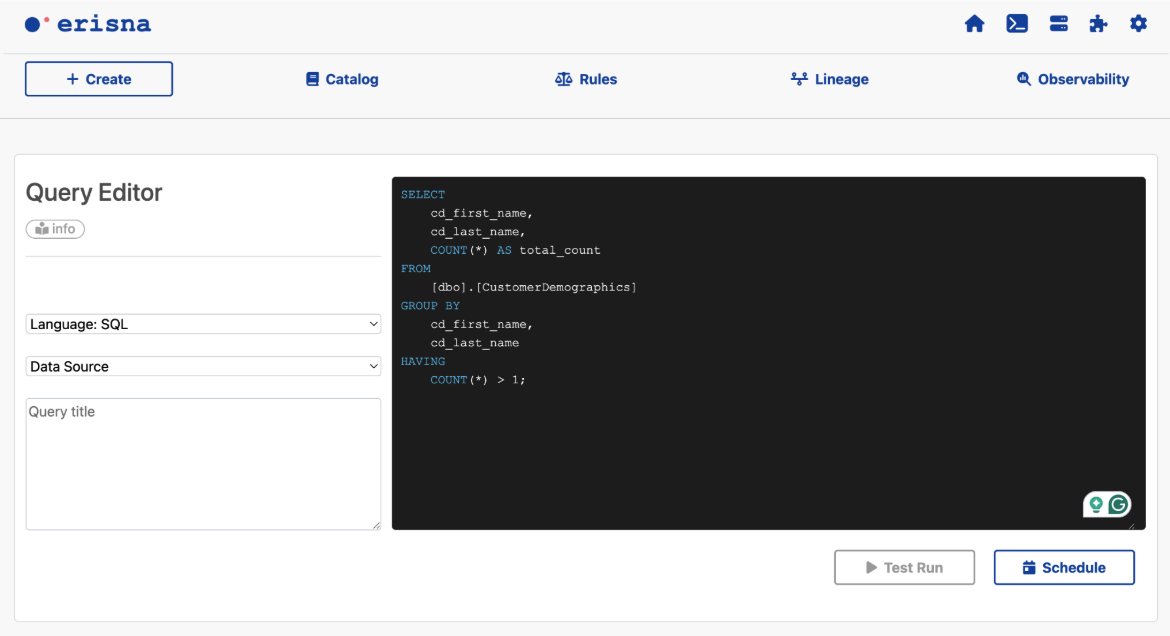The Erisna Data Catalogue provides a single source of truth and a centralised repository with details of the structure, schema, meaning, ownership, data classifications and usage of data elements in your organisation's datasets.
Data Contract Sharing allows you to securely share data catalog items with third parties and other organisation whilst keeping the rest of your catalogue private.

Run data validation within the Erisna Platform with the click of a button. Check for duplicates, missing mandatory field values, wrong data formats and more.

When data validation checks fail, the Erisna Platform automatically generates a downloadable data cleansing report, pinpointing the exact record within your database table where the invalid data exists.

Erisna Business Rule Engine enables data teams to define or restrict actions within your organisation's operations. These rules can be organisation-wide or industry-specific.

Data issues can silently disrupt operations, erode stakeholder trust, and consume valuable engineering time.
Erisna Data Observability enables you gain end-to-end visibility into data quality across your pipelines. It continuously monitors, validates, and surfaces anomalies in real-time—empowering your team to detect issues early, reduce data downtime, and maintain data integrity without manual oversight.

The Erisna Platform enables you to write custom SQL queries for data validation checks against your data quality requirements. These queries can be run immediately, or scheduled to run daily.

Facilitate data governance by establishing clear policies and standards for data management, assigning data ownership and responsibilities, establishing data access controls and ensuring regulatory compliance.

Business Glossary sometimes called Data Glossary is a list of business term definitions that describe business concepts within your organisation. These terms are typically used on a daily basis in your organisation. For example, customer, product, manufacturer and supplier.
Your Erisna Business Glossary enables a shared understanding of business terms and nuances in data collection across your organisation to ensure that everyone is referring to the same thing.

Map and visualize your data assets to understand the overview and detailed semantics of your organisation's data and how they are related.
For example, Erisna Data Mapping enables you to match dataset fields from one source system to dataset fields in a target system to standardise your data, reduce errors, and make it easier to understand your data.

Erisna Data Lineage enables you to track the flow of data over time, providing a clear understanding of where the data originated, how it changed, and its final destination.
This auto-generated data lineage illustrates two levels of granularity; coarse-grained and fine-grained.

The Erisna Database Diagram illustrates a visual representation of datasets or tables from your data source.
This auto-generated diagram illustrates the structure of your database, its tables, column names, data types, primary and foreign keys, and relationships between the tables.

Classify and monitor your datasets based on regulatory requirements, retention periods, sensitivity, importance and predefined criteria. This is foundational to data security and enables regulatory reporting and audit readiness. Examples include PII, GDPR, HIPAA, etc.

Auto-detect sensitive data such as PII (personally identifiable information), business confidential and classified data.
This enables your team to identify information that may need to be masked or obfuscated to protect it from unauthorised access and ensure your organisation stays complaint with regulatory requirements.

Erisna Data Health Check allows you to actively track and monitor the quality of datasets across your organisation.
Our completeness score enables your data team to determine how complete, accurate and consistent your data is. In contrast, our trust score indicates the percentage of your data that is error-free and valid.

The Erisna Platform is database agnostic. Connect to your database or file, automatically scan their data structures, and import them into your Erisna Data Catalogue.

Erisna API enables your data team to fully automate data validation processes across your organisation, with support for over 15 programming languages such as Python, Java, C, Go, C#, JavaScript and more.
Our API documentation is a collection of references, operations, endpoints, parameters, descriptions, schema and examples that help developers and data engineers use our API.

Receive alerts on Slack and Microsoft Teams or enable email notifications. Save time, avoid context-switching and collaboratively work in a unified and secure way.
